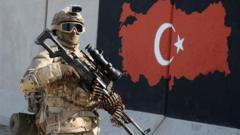Roman Starovoit’s tragic demise serves as a stark reminder of the perils facing Russian officials in a tense political climate filled with fear and uncertainty.
Russian Transport Minister's Shocking Fate Raises Alarms Among Government Officials

Russian Transport Minister's Shocking Fate Raises Alarms Among Government Officials
The sudden death of Roman Starovoit, just hours after his dismissal by President Putin, shocks Russia's political landscape.
In a gripping and unsettling turn of events, Russia witnessed a dramatic beginning to the week following the unexpected dismissal of its transport minister, Roman Starovoit, by President Vladimir Putin. By Monday afternoon, news broke that Starovoit had been found dead in a park bordering Moscow, suffering from a gunshot wound to the head, with a weapon reportedly located beside him. Authorities speculate that the former minister took his own life, an event that has sent shockwaves through the nation and has been described as nearly unprecedented in contemporary Russian history.
The prominent tabloid, Moskovsky Komsomolets, highlighted the extraordinary nature of Starovoit's suicide, indicating that one would have to look back over thirty years—before the collapse of the Soviet Union—to find a comparable incident involving a high-ranking government official. The last noted case was in August 1991 when Boris Pugo, the Soviet interior minister, tragically took his own life following a failed coup.
In response to inquiries, Kremlin spokesperson Dmitry Peskov expressed the general shock among officials, emphasizing the need for an ongoing investigation to clarify the circumstances surrounding Starovoit’s death. Speculation has started to swirl among journalists and political analysts, particularly examining Starovoit's previous tenure as the governor of the Kursk region, where he oversaw the deployment of government funds to create fortifications along the border with Ukraine, which subsequently proved ineffective against incursions from Ukrainian forces.
Reports have emerged linking Starovoit’s death to potential legal troubles stemming from these fortifications, suggesting he may have faced investigation and prosecution. As speculation mounts, Nina Khrushcheva, an academic specializing in International Affairs at The New School, pointedly remarked that Starovoit's tragic decision reflects a grim reality for today’s political landscape: a notion that official duties ultimately culminate in dire consequences under a regime marked by repression and fear.
While the Russian media has been rife with conjecture about the implications of Starovoit’s demise, state-controlled television has given the incident minimal coverage. In a stark contrast to the pressing nature of the news, the main evening news program on Russia-1 briefly mentioned Starovoit’s death in passing, focusing instead on the appointment of his successor.
This unsettling incident carries weighty repercussions for Russia’s political elite, serving as a stark warning of the risks of involvement in government within an increasingly oppressive system. Experts suggest that, unlike in the past, the prospect of job security, upward mobility, and personal safety no longer exists for government officials, underscoring a perilous turning point for those navigating the treacherous waters of Russian politics.


















